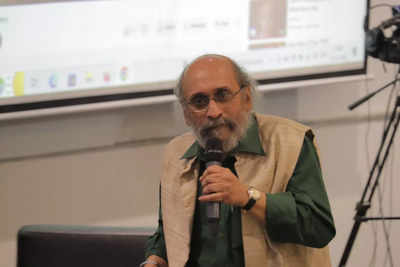'Ethics isn't just about law, but also our perceptions'

In his masterclass on media ethics, veteran journalist Paranjoy Guha Thakurta shared his extensive knowledge in reportage and the responsibility it brought. Photo by Saksham Maurya
By Aryamaan Jit Singh Bawa
One of the leading investigative journalists in India,
The
“India’s unique advantage is its population. Surpassing China, it’s now the target market for conglomerates and digital monopolies like Alphabet and Meta,” he said going over the current position of India in the digital age. “The change in India is not only dramatic, but unprecedented, these companies will not only decide to determine what we see or hear but the way we think and how we behave and influence our preferences themselves, and above that, they aim to predict your behavior,” he warned the students about the true goals of these corporations and how they aim to control the consumers of today.
He also raised questions about the freedom of press in India and said, “What has the media become, who holds truth to power, and who holds people in positions of power accountable for their actions? You must question yourselves as the future of this country - Is this good for this democracy and for this country? And this will lead you to your own logical conclusions,” he said, to help the students introspect about their way ahead and the responsibilities they had as students of mass media.
Sharing his experiences and many insights with the students during the session, he reminisced about his experience as a petitioner in the PIL for the
Throughout the session, Thakurta shared his extensive knowledge in reportage and the responsibility it brought, discussing the predicament of ethics in the digital age and in the industry today. “Ethics isn’t just about the law, but about our perceptions of virtues and vices,” he said.

Thakurta also played a 3-minute snippet from his documentary film “The Great Indian Telecom Robbery” to help relate the situation of 2023 to that of previous years and how the situation has been on a constant decline.
He helped relate these massive scandals with a personal experience of his involving Rahul Gandhi. “I have been a victim of disinformation myself, I went to Rahul Gandhi’s Bharat Jodo Yatra for a chance to meet him and clicked a photo of him having tea with his consent and posted it. Minutes later, I started getting calls from journalists and fact checkers who were asking about the picture I had posted and if it was real. Some trolls had morphed the photo and had started circulating a picture of him drinking alcohol. Before I could contest it and rectify the situation, the damage had been done,” he said while raising concerns about how “Whatsapp University” is one of the leading causes and accessories to disinformation and misinformation alike.
“It goes beyond fake news, disinformation, and political, commercial and criminal propaganda and is coming down to plain and simple criminality, where the misuse of social media has become an accessory to criminal offences,” he said on the topic of the effect of social media on modern India where social media and digital connectivity are no longer an urban phenomenon.
“The internet is a double-edged sword and has changed society forever. I’d be a fool if I said humans have not developed, but while focusing on the positives, we must be weary of its drawbacks and very real limitations,” he said to conclude the session.
(The writer is a Semester II student of BA (Journalism and Mass Communication) programme.)










Recent Messages ()
Please rate before posting your Review
SIGN IN WITH
Refrain from posting comments that are obscene, defamatory or inflammatory, and do not indulge in personal attacks, name calling or inciting hatred against any community. Help us delete comments that do not follow these guidelines by marking them offensive. Let's work together to keep the conversation civil.